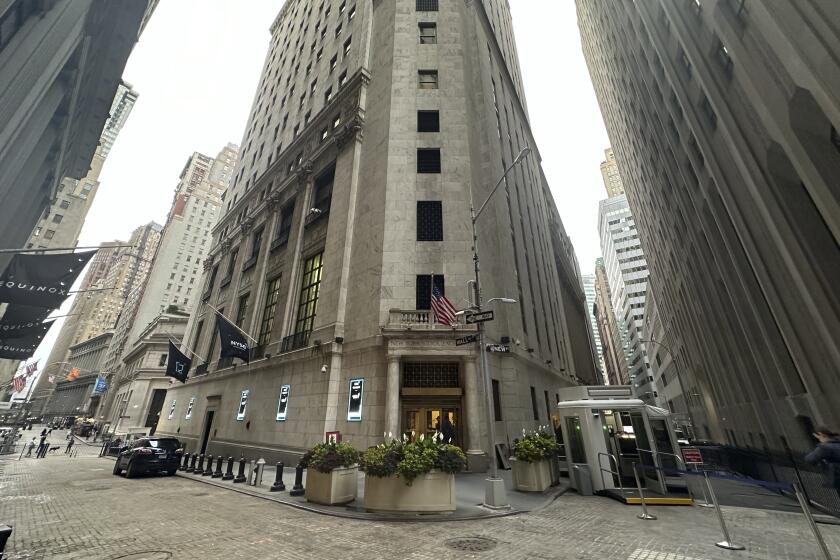STOCKS : ‘Witching Hour’ Rouses Traders; Dow Rises 11.62
Stocks ended a listless session with a bang Friday, as Wall Street worked its way through a quarterly “triple witching hour.” The Dow Jones average of 30 industrials rose 11.62 points to 2,965.56, trimming its loss for the week to 34.89 points.
In the broader market, advancing issues outnumbered declines 841 to 686 in nationwide trading of New York Stock Exchange-listed stocks.
Big Board volume came to 194.42 million shares as of 4 p.m. EDT, against 163.81 million at the same point Thursday. In after-hours trading, an additional 205,400 changed hands.
“I think our market activity today (Friday) was based strictly on the options (expirations),” said Alice Sadlo, a vice president at McDonald & Co. “The real buyers were not interested in getting involved because of triple witching.”
The session began with a heavy flow of orders from traders engaged in strategies involving a group of expiring stock index futures and options, along with the stocks that make up the indexes.
Another round of expiration-related activity passed in orderly fashion at the close, pushing prices slightly ahead from mixed late-afternoon levels.
The “witching hour,” which occurs on the third Friday of March, June, September and December, once tended to produce wide and dramatic swings in stock prices.
Beyond that special influence, analysts said the market was still burdened by worries over interest rates and corporate profits.
One figure that did cause a little stir was the $53.35-billion budget gap in May, a record shortfall. The news dampened bond prices and sent shares lower for a time.
Among the market highlights:
* Columbia Gas System continued to slide, losing 1 3/8 to 17. Earlier this week the company threatened bankruptcy and failed to make a $15-million interest payment, sending its stock reeling.
* Boeing Co. slid 1 3/4 to 47. Traders said Paine Webber, Goldman Sachs and Morgan Stanley lowered estimates on the company after Boeing said research and development spending could be higher than expected.
* Surgical Laser tumbled 3 1/2 to 7 1/2 after it said late Thursday that it expects a loss in the second quarter.
* International Business Machines recouped some ground, gaining 1/2 to 99 5/8 after falling Thursday on a gloomy second-quarter earnings forecast. Shearson Lehman Bros. initiated coverage of IBM with a buy rating.
* Shares of Time Warner, which have fallen since it announced a rights offering, gained 1 3/8 to 91 3/4. Smith Barney reaffirmed a buy rating.
* USAir lost 5/8 to 16. First Boston lowered its estimates on the airline, citing industrywide problems with yields and revenue.
Stocks closed higher in foreign trading.
German shares ended almost 1.5% higher, driven up by euphoria about the choice of Berlin as the seat of the German government and heavy futures-related buy orders from domestic and foreign investors. The 30-share DAX average ended 24.83 points firmer at 1,711.86.
Stocks seesawed in Tokyo to end firmer for a second day. The 225-share Nikkei average rose 192.82 points to close at 24,275.08.
London’s Financial Times 100-share index closed 7.6 points higher at 2,487.5, compared to 2,522.3 last Friday.
Credit
The bond market sold off, reacting to the rising federal deficit and another sign of economic recovery.
The Treasury’s bellwether 30-year bond fell 15/32 point, or $4.69 per $1,000 in face amount. Its yield climbed to 8.51% from 8.46% late Thursday.
The long bond dropped in morning trading after the Federal Reserve Bank of Philadelphia reported that business and industry in southern New Jersey and around Philadelphia were rebounding, said Kevin Flanagan, a money market economist at Dean Witter Reynolds Inc.
Bond prices generally drop on signs of economic strength because that indicates the Fed is unlikely to lower interest rates to stimulate the economy. Lower interest rates push up bond prices.
Credit market analysts said the the higher deficit could force the government to borrow more money from the public by issuing bonds. That could create an oversupply of fixed-income securities, which would depress prices.
“The larger the deficit, the more we have to finance in the Treasury market,” Flanagan said.
The federal funds rate, the interest on overnight loans between banks, was quoted at 5.688%, down from 5.75% late Thursday.
Currency
The dollar was mostly higher in quiet trading Friday, as the foreign exchange markets awaited the outcome of a weekend meeting of Group of Seven monetary officials.
In New York, the dollar rose to 1.8015 German marks, from 1.7915 late Thursday and 138.90 Japanese yen from Thursday’s 138.22.
Other late dollar rates in New York, compared to late Thursday’s prices, included: 1.54785 Swiss francs, up from 1.5355; 6.1225 French francs, up from 6.0925; 1,341.25 Italian lire, up from 1,334.00, and 1.14325 Canadian dollars, up from 1.1415.
Commodities
Prices of cattle futures on the Chicago Mercantile Exchange tumbled Friday to an eight-month low in one contract and session lows in others. Other meat and livestock futures also declined.
On other commodity markets, grains and soybeans futures plunged; precious metals slipped, and energy futures were mixed.
Live cattle settled 1.5 cents to 0.05 cent lower, with the contract for delivery in June at 71.87 cents a pound; feeder cattle settled 0.48 to 0.15 cent lower, with August at 87.25 cents a pound; live hogs were 0.40 cent lower to 0.80 cent higher, with June at 59.22 cents a pound; frozen pork bellies were 2 to 1.43 cents lower, with July at 53.32 cents a pound.
Pressure in cattle came from large commission house selling typical at the end of a near-term contract that drew the futures below key support levels. The June contract ended Friday. August cattle settled 0.47 cent lower at 71.50 cents a pound, the lowest level since January, when prices are historically low.
Sluggish demand continued to affect the futures, with retailers buying only to fulfill immediate needs in anticipation of lower prices down the road.
On New York’s Commodity Exchange, precious metals were pressured by selling of positions for the weekend and the possibility of a firmer dollar out of Sunday’s meeting of industrialized nations.
Gold settled $2.40 to $2.10 lower, with June at $365.90 an ounce; silver settled 7.1 to 7 cents lower, with June at $4.374 an ounce.
Light sweet crude oil was unchanged to 6 cents higher, with July at $19.87 a barrel in trading on the New York Mercantile Exchange.
More to Read
Inside the business of entertainment
The Wide Shot brings you news, analysis and insights on everything from streaming wars to production — and what it all means for the future.
You may occasionally receive promotional content from the Los Angeles Times.










